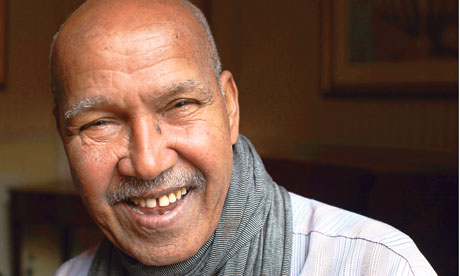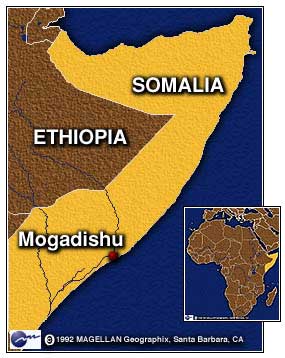 Somalia is no longer what it was. It's past reconstruction. How can you reconstruct a country that's self-destructing continuously?'
Somalia is no longer what it was. It's past reconstruction. How can you reconstruct a country that's self-destructing continuously?'
In a hotel beside a Norwegian fjord, encircled by snow-streaked mountains, the novelist and playwright
Nuruddin Farah has his mind on warmer waters."Are they pirates?" he says of the Somalis who hold ships hostage off the Horn of
Africa, where he was born. "What they do has the characteristics of piracy. But that wasn't how it started." He fixes his eye on the Arctic trawlers in the harbour. "The majority were fishermen who lost their livelihoods to Korean and Japanese and European fishing vessels, fishing illegally in Somali waters. I'm not condoning the things they're doing. But there are unanswered questions. Someone is not telling us the truth."
Over 45 years, Farah has pursued complex, elusive truths as one of Africa's greatest novelists, and a cosmopolitan voice in English-language fiction. He was driven into exile by the Somali dictator
Mohamed Siad Barre, who ruled from 1969 to 1991, and he now lives in Cape Town. But all 11 of his novels (translated into 20 languages) are set in Somali-speaking lands, one impulse being to "keep my country alive by writing about it". When I first met him in London in the 1980s, he was with Salman Rushdie at a Royal Court play, and his became a staunch Muslim voice against the fatwa. Rushdie writes in his new memoir of seeking his friend's advice on how to depict a country lost to him: "'I keep it here,' Nuruddin said, pointing to his heart."
For Nadine Gordimer, Farah is one of the continent's "real interpreters". Aged 66, he has lived in 10 African countries and is often cited by other African writers as overdue for the Nobel. His novels scourge received opinion – whether of female inferiority (he writes women characters who make their own destinies), religious dogma, nationalism (
Maps), foreign aid (
Gifts) or clannism (
Secrets). They trace the history of a region long an arena for proxy wars and great power rivalries, in an oblique, metaphorical style that marries proverbial wisdom ("a dead man's shoes are more useful than he is") with daily life in a modern African state awash with sim cards and AK47s.
Crossbones is the final volume of a trilogy,
Past Imperfect, set in the civil war that erupted when Siad Barre was ousted. In
Links (2004) a Dante scholar returns to the seaside capital Mogadishu to find StrongmanNorth and StrongmanSouth battling with US Marines in the infernal, Italianate ruins. In
Knots (2007) a Canadian-Somali actress arrives as the warlords have been vanquished by bearded men in white robes, foisting "body tents" on women. By
Crossbones, the ascendant Islamists – whom Farah terms "religionists" – are spoiling for war with Ethiopia, while piracy proliferates off the breakaway coastal region of Puntland.
I spoke to Farah as a peace process was under way in
Somalia that culminated in the inauguration last Sunday of the country's first elected president in decades. The author was in Tromsø, a tranquil town of clapboard houses and silver birch trees 360km north of the Arctic Circle, to address global Ibsen experts
He was already "pregnant" with his first published novel,
From a Crooked Rib (1970), when he read Ibsen's plays as a student of philosophy and literature in India. The novel-in-progress was the tale of a fight for selfhood in a world where women are "sold like cattle", told through the eyes of a 19-year-old nomadic woman. "I could not have written
From a Crooked Rib if I had not read
A Doll's House," he said at Tromsø University.
Growing up in Somalia and Ethiopia, and studying in India, he tells me, "I saw, on a daily basis, women beaten, girls not sent to school, and the injustices meted out to women. But at 19 or 20 I lacked the courage to articulate it." The gulf between Ibsen's Nora and his unlettered pastoralist clarified his task: "For Ebla, even in a metaphorical sense, there was no door to slam."
From a Crooked Rib became a Penguin Modern Classic in 2004. At a time when fiction in Africa was more focused on colonial power and emerging nationhood, Farah scrutinised the intimate power play between men and women. The novel was subversive in other ways. Some women berated Farah for trespassing on their realm for exposing the horror of female genital mutilation practised among Somalis (a practice banned last month under Somalia's new constitution).
His second trilogy was conceived when he returned to Somalia in 1996, for the first time in 22 years, and was taken hostage by a minor warlord. In Kismayo, "I was kept incommunicado for a few days. The warlord sent a technical [vehicle] with 16 gunmen; he'd been told wrongly that I was a journalist, and wanted me to write an article praising him." The warlord's sister-in-law pleaded for Farah's release: he had been her school teacher in the early 70s. Reconsidering, his captors demanded that he deliver lectures. He complied, since there was nowhere to escape to. He shrugs at the absurdity: "I was held hostage and gave lectures to the community."
Later in Mogadishu, he was "shocked by the destruction. It was a country I didn't recognise, and many of the people in it were newcomers." Since the 10th century, he argues, Mogadishu had been a cosmopolitan city-state, but with the civil war, "it lost its old inhabitants – some of Persian, Arab and Indian origin who had intermarried. Its character changed." In an essay, "Of Tamarinds and Cosmopolitans", Farah wrote of a clash not of clans, but between pastoralist nomads and urbanites, in a once "open city with no walls". But he was moved by his welcome as one of Somalia's most famous sons (a celebrity matched only recently by the British Olympian Mo Farah): "People touched me and said, Nuruddin is back, life is here. Others will come."
Born in 1945 in Baidoa, in Italian Somaliland, Farah went to school in Ogaden (ceded by the British to Ethiopia) and Mogadishu. His father was an interpreter for the British governor, and his mother an oral poet.
He used English textbooks, took Qur'anic lessons, and spoke Amharic, Arabic and Italian too. He claims an American typewriter had much to do with his choice of literary language. But his efforts to write in Somali, once it gained a written script in 1972, were curtailed by censorship. All his novels were later banned, and read only in smuggled copies.
His first wife was a student from Bangalore whom he met while studying in Punjab ("her father and I played chess"), and their son is now an auditor in Detroit with two small daughters. Leaving Somalia in 1974 to do a master's degree in theatre at Essex University, Farah worked at London's Royal Court ("making tea").
When his second novel,
A Naked Needle (1976), riled Somalia's despot, his brother advised him not to return. He was sentenced to death in absentia. "The country died inside me, and I carried it, for a long time, like a woman with a dead baby," he says. "It became the neurosis from which I write."
After a trip that took in the Soviet Union, Greece under the colonels and Sadat's Egypt, he wrote his first trilogy, Variations on the Theme of an African Dictatorship (1979-83), consisting of
Sweet and Sour Milk,
Sardines and
Close Sesame. He once challenged fellow Somalis to "study the structure of the Somali family and you will find mini-dictators imposing their will … We become replicas of the tyrant whom we hate. When you rid yourself of a monster, you become a monster." Somalia's implosion, which he predicted as early as 1988, fuelled a personal crisis. His mother died in 1990, when it was still unsafe to return. He got married for a second time, to a British-Nigerian academic, and moved to northern Nigeria, then South Africa.
In his talk in Norway, he described being in a "very difficult marriage, much worse and more debilitating than Nora's, even though I stayed in it ... maybe because I was in mourning". As he sees it now, the collapse of Somalia "necessitated the creation of a foundation. I was afloat, and needed an anchor. Marrying became an anchor – which was probably wrong." When the couple eventually split, and his children were taken to California, "it reminded me of when I couldn't see my [elder] son." At that time, "I couldn't go back; I was being hunted down. Two attempts at killing me were made, in Nigeria and Rome."
As his second marriage foundered, "writing became hard; living a lot harder." It took a dozen years to complete his second trilogy,
Blood in the Sun (1986-98), begun with
Maps, set during the 1970s Ogaden war, and
Gifts, at a time of famine.
Secrets unfolds on the eve of civil war, and he deems it a pessimistic book. "I was pretending to be happy, but wasn't. It's a novel that predicts terrible days." As a nation ruptures along bloodlines, the novel evoked incest and bestiality, "to make everyone sit up and see the ugliness of what was happening. The entire country was a death camp".
Farah met his father for the first time in 17 years in a hospital in Mombasa, Kenya, and was told: "We fled because we met the beasts in us, face to face." Farah's son and younger sister also fled by boat. In the non-fiction
Yesterday, Tomorrow (2000), based on conversations with Somali refugees, Farah extrapolates from his own exile the anguish of people without means, education or a writer's creativity, when their country ceases to exist. The voices are "raw, tearful, pained". The book was spurred by "two types of Somali: the poor in refugee camps in Kenya; and the rich, corrupt sons and daughters of the dictator and his cronies, staying at the Hilton in Nairobi and flying in private jets. I was interested in where the future of Somalia lay."
He has been back often since 1996, and played peace- broker between armed groups in an effort curtailed by the Ethiopian invasion of 2006. Somalia, he says, is "full of stories. We say, 'one sick person; a hundred doctors'. Somalia is a sick country and everyone has an opinion. Mine is one version; in a civil war, there are millions." In
Links he wanted to offer an alternative angle on the US intervention of 1993 to the film
Black Hawk Down. The trilogy was conceived, he says, in the context of "misunderstandings, misconceptions and missing the point", chief among those being that the conflict is clan warfare. Farah does not see himself as belonging to a clan. "Anyone who claims to represent a clan is a dastardly liar. You can represent people who elected you. I can't represent my own brother."
Crossbones also casts doubt on reports of boom towns rich on piracy. Farah visited Puntland, and says: "I did not see that wealth." The novel suggests those up the food chain, and abroad, take their cut. "Nobody wants to talk about illegal fishing or the destruction of the environment – the marine life and coral reefs. What we talk about is the consequences of this destruction. There's enough UN information about nuclear and chemical waste dumped on the shores of Somalia – the tsunami unearthed it. Entire communities in Puntland have children born with deformities."
Crossbones takes place against the rise of al-Shabaab, the military wing of the Union of Islamic Courts, which has claimed allegiance to al-Qaida. Farah, who is a professor at the University of Minnesota in Minneapolis, says susceptible teenagers were "told they were fighting an enemy: infidels, unbelievers, Ethiopians, the federal government." The militant leaders are hypocrites, he adds, who "leave their own sons and daughters in school, and recruit other people's." Taxliil in the novel, a troubled teenager briefly inducted by the militants, has no exit but via Guantánamo. Farah is indignant that "he is going to prison. He's been misled by people who don't go to prison, but their names are known."
Al-Shabaab's withdrawal from Mogadishu in August last year heralded the city's rebirth, with the return of many expatriates. Rather than having been routed by peacekeepers, Farah says, "Shabaab's beastly attitudes alienated people, with stories of women raped and pregnant, whipped, killed. People were afraid; now no longer. More understand that Shabaab has nothing to do with religion; it's interested in political power." He was once attacked online for insisting the "Afghan-type body tent is not culturally Somali. I said: 'My mother never wore a veil, nor my sisters.' They said my mother was not a Muslim." In the diaspora, he argues, "the majority could not articulate their Somali culture. The less you know about Islam, the more conservative people become."
When the National Theatre in Mogadishu was devastated by a suicide bomb last April, only two weeks after reopening, Farah's response was to write a short play in Somali, though its staging may take time.
Three more of his recent plays are being translated into Somali. As Jean Anouilh set Sophocles in Nazi-occupied Paris, Farah's
Antigone in Somalia is set during the Ethiopian occupation of Mogadishu of 2006-09. Antigone's brother, whose corpse cannot be buried, is a suicide bomber. In areas al-Shabaab controls, says Farah, they have "forbidden song and dance because they're closer to Wahhabism than most Somalis".
Theatre that is verse-based, and sung to music, "challenges everything such groups represent. They say it's evil, Satan's work, and that a woman's place is not on the stage." Yet visiting Mogadishu in the spring, he found people "playing music and singing in tea houses and at parties. Women have created their own space."
Somalia's President Hassan Sheikh Mohamud, elected by MPs, took power last week, four days after surviving a suicide bombing for which al-Shabaab claimed responsibility. Though Farah has reservations about "electing MPs and president on a clan-based formula", he believes there is no present alternative, given years of war. The president, whom he has met, "struck me as trustworthy, a man capable of uniting the country and taking it forward, away from attrition and in-fighting."
Though his protagonists strive to leave their homeland better than they found it, good intentions go awry. Farah notes a pessimistic turn in his fiction, "and the reason is, Somalia is no longer what it was. No matter how the characters struggle, how can you reconstruct a country that's self-destructing continuously?" Then, under a blazing Arctic summer sun that refuses to set over the harbour, he rallies: "I'd like the dust to settle first. It will take five more years of peace. Then good things will come."












